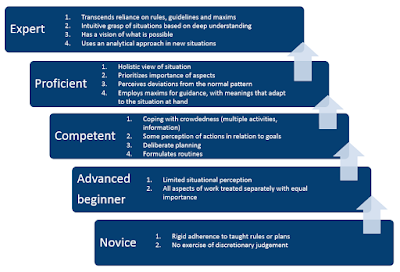The above quote is taken from a reflection entitled Empowerment, Passion and Unified Purpose which includes valuable feedback from staff after Phase 1 of our Schools That Deliver professional learning journey in 2018. At the time, all staff articulated a shared vision and identified the core values needed to bring the vision to life.
When one staff member stated, "... Let the ruckus storm journey begin..." little did we comprehend the enormous challenges we would encounter during the storming phase of our journey.
 |
| Edwards and Martin's definition of the storming phase based on the work of Tuckman |
The April 2018 to April 2019 research year resulted in deep storming. Storming is the outcome of tension between where a group is at and where it needs to go; in our case to align with the shared vision. Weathering the predicted stormy seas during the action research year was challenging for many staff. Eventually, every voice contributed to outstanding research presentations and in doing so grew as educators ready to embark on Phase 2; the norming part of the lifecycle of a healthy, collaborative group.
 |
| Slide from presentation Day 1 Schools That Deliver Conference |
Here is a link to the process that led to the Schools That Deliver professional learning journey. Students become the leaders of the future through internally driven change.
Here is a link to our shared vision and core values as voted by the staff in April 2018. Staff generate future focused shared vision for all learners.
The slide below from the Schools That Deliver presentation shows the forming and storming part of Phase 1 of our professional learning journey.
Phase 2 April 2019 - Staff Share Powerful Presentations
Staff are to be commended for the research they carried out as evidenced in powerful and creative presentations (including treasure hunts, quizzes and dance) shared on the first of two days of our personalised Schools That Deliver Conference.
After a school term that highlighted the resilience and collegiality of our incredible staff, every research team member gave of their best when presenting the culmination of twelve months of learning. Staff shared analysis of rich survey data and professional readings to support their recommendations.
The four research teams focused on key areas that staff had collectively agreed were vital for realising our shared school vision. The four areas are prayer, well being, feedback and inquiry.
Here is an outline of the key recommendations from each research team and the connection the teams made to our shared vision:
Our Faith Community
"St Patrick's is a school where our Catholic culture underpins all we do. Our staff teach and model Catholic values making our faith real and relevant to the students. We practice daily prayer and promote fluidity between our parish, school and parent body..."
- We have a Catholic culture that invites all to prayer, enabling deep encounters between faith and contemporary life.
- To enable this encounter with God through prayer, all staff and students learn about the different forms of prayer and make them a part of our daily practice.
 |
| The Faith Community team present their research to staff. |
Social and Emotional Wellbeing for ALL Learners
" A healthy mindset, coupled with resilience and well-developed social skills ensures all learners are equipped to deal with life's challenges, and have the skills to positively resolve conflict and communicate their ideas and emotions... Learners leave St Patrick's self-motivated ready to make a positive impact on their world."
Students leave St Patrick's with a sense of belonging, self-motivation and ready to make an impact on their world...Sense of belonging. This will happen through:
- A well being programme that targets the needs of our learners and builds their "sense of belonging'
- A whole school Wellbeing program created and owned by all stakeholders at St Patrick's
- This program would be a working document that evolves and can be adapted/customised to meet the needs of our learners.
 |
| One of the slides from the Social and Emotional Wellbeing for All presentation |
The Power of Feedback
- We have a feedback culture where staff, students and parents receive rich, timely, regular feedback.
- All staff have a clear understanding of feedback strategies
" Ongoing data tracking leads to learning that is differentiated therefore optimising engagement...Both students and teachers are excited about learning, involving themselves in rich, open ended tasks both inside and outside the classroom...Learners leave St Patrick's self motivated and ready to make an impact on their world."
- We access a comprehensive Prep to Year 6 Inquiry Planner that follows a "good fit" model,
- Our inquiry planner reflects student voice which is collected in the early stages of the unit of work
Following the staff presentations, a facilitative questioning process (Butler & Edwards), was used to determine agreed mental models (values and beliefs that drive behaviours) to guide future actions. Then design teams contributed recommendations towards the sequence for a school improvement plan. The plan addresses the priority work needed for the next five years to drive the school vision forward and ensure we make a positive impact for all learners.
 |
| The School's That Deliver facilitators used this approach to draw out staff mental models |
 |
| Draft plan presented to the staff by the principal in response to staff recommendations |
Special recognition is given to the Schools That Deliver Network for the inclusion of their slides in this reflection. In particular, our heartfelt thanks go to Mary Wilson, Bill Martin, and Teresa Edwards for facilitating the conference with great wisdom and expertise; involving the active participation of our team of forty staff over two full days.

















